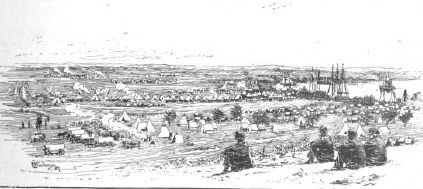Ironton Register 5 April 1888 – In the early days of ’61, before the rebellion was in fair shape and fighting was new and strange, war lowered about these borders so darkly as to make public apprehension serious and sad. There was a disposition at various points, not remote from the Ohio River, to set up the standards of the Confederacy and maintain the southern idea to the extent of whatever bloodletting was necessary.
The region of Trout’s Hill or Wayne Courthouse was one of these rendezvous of disloyalty, and many were the alarms that came from that town, of the hosts of the gathering setting themselves up to dispute the efforts to maintain the authority of the Union.
There was a man known as Bill Smith, whose name brought terror to the listener and whose cruel minions were ever dodging along the Kentucky and Virginia horizons. Col. Zeigler was then forming a regiment in the new and novel town of Ceredo, and every night or so, Bill Smith startled the camp into battle array. Sometimes Bill Smith wasn’t within twenty miles of the place, but the name mentioned in the middle of the night was a call to arms!
Two years ago, the writer of this sketch, Captain Thomas Winters, stood in the old-fashioned courthouse at Trout’s Hill. Not a hammer or brush had been used on the old edifice since the days of Sumpter, and many a little scar on wall and pillar recalls those times of excitement and alarm when from the woods and hills that fringed the town, the watchful bushwhacker sent his bullet to crush the invader of the sacred soil.
One bullet hole we noticed in a pillar that sustains the floor – a good round hole that was far better in the pillar than in some soldier’s body. We wondered at the time what sort of history that bullet could tell, and of the scramble, it made when it whistled through the door and ‘chugged’ in the wood.
“What’s your ‘Narrowest Escape’ in the array?” asked the reporter of Captain Thomas Winters who was standing on the corner watching the workmen pulling down the brittle walls of the burnt Merchants Block.
“Oh, I don’t know,” says the Captain “the hardest time I ever experienced in the army was at Moorfield while crossing the river. It was an awful experience, but nothing personal-no close call.”
“Well, something of your own is what I’m after,” said the reporter.
“Let me see then,” said Captain Thomas Winters, looking about meditatively a moment, “a little affair up at Trout’s Hill, in the early part of the war, made me shiver about as coldly as anything that happened. My Company G 1st Virginia Cavalry was sent there with two companies of Col. Zeigler’s Regiment, the 5th Virginia Infantry, to get the public records and care for the county property.
“We took the town without trouble and stayed there two or three days, gathering what county records we could and holding up the stars and stripes in the face of the bushwhackers. We camped in the courthouse, which was the occasional target for some of Bill Smith’s gang.
One day I stood in the door, enjoying the sunshine and the stars and stripes, and the boys rollicking on the grass in front, when “bang” went a rifle from the copse nearby, and “zip came to a bullet right over my head, so close as to raise the hair, and struck in a pillar just back of me. I jumped inside and congratulated myself on my narrow escape. I have thought many times I’d like to go up there and see the mark of that bullet again, but I expect it has long disappeared under the magic hand of time or progress.”

“No, captain,” said we, “it’s there yet, or was it a year or two ago? We saw it and wondered what history it might tell, never dreaming we would find the hero of that bullet.”
“Indeed? And it is there yet? Well, well, I must go up and see where the ball that come for me, but didn’t find me, has been lodged all this time.”
“And if you go,” said we, “tell us more about it when you return.”
“I will.”
Obituary of Captain Thomas Winters, Sr.
Ironton Register 9 Feb. 1893
Captain Thomas Winters, Sr. was born on 12 Feb. 1815 in Chillicothe, Ohio. He married his first wife, Mary Jane Parker in Hamden, and had five children. He married the second time in 1852 to Lavinia Bush who died seven years later. Captain Winters was in Company G, 1st Virginia Cavalry in the Civil War during 1861 and was injured in the early Spring of 1863. Captain Winters was a member of Spencer Chapel for 50 years.

0 Comments